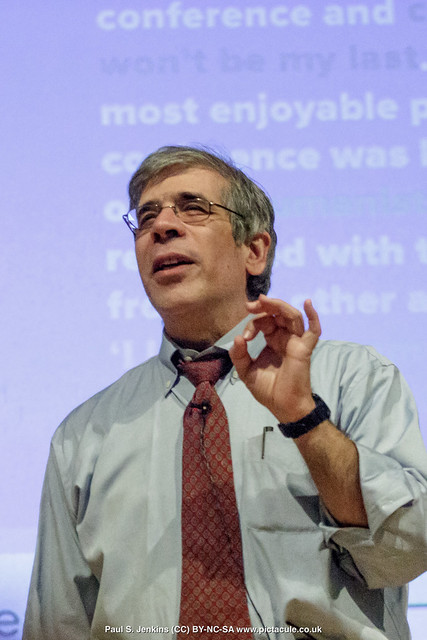I'm a bit worried about my credentials as an atheist ("gnu" or otherwise). I know who the Four Horsemen are, but I couldn't tell you which came first (was it Dennett or Harris?). Off the top of my head I can't give you the entire URL for
Pharyngula, nor can I reliably list all the hosts of the
Atheist Experience TV show. I know there were lots of historical figures who professed atheism, but I certainly couldn't list them.
As if these failings weren't serious enough, I find I'm also unable to recite the full title of
Charles Darwin's seminal work known for short as
The Origin. Surely no
true atheist would fail so miserably at declaring atheism's central dogmas?
Oh wait. Atheism has no dogmas, so I've nothing to declare but my lack of belief in a god or gods.
In an amusing but spurious bit of table-turning, this morning
Richard Dawkins found himself being put on the spot by
Giles Fraser on the
Today Programme. Dawkins was unable to reel off the
The Origin's full title when challenged to do so, and for this embarrassing blanking of mind in the heat of a live radio discussion some Christians have unjustly accused him of hypocrisy.
To those Christians I would say you're missing the point. Listen to the radio piece itself:
http://news.bbc.co.uk/today/hi/today/newsid_9696000/9696135.stm
Here's the
Today Programme's page on it:
Research carried out by for a secularist foundation has suggested
that most of those who describe themselves as Christian in Britain have
only a low level of belief and practice of the religion.
A poll
carried out by Ipsos-Mori for the Richard Dawkins Foundation for Reason
and Science indicated that half of those in Britain who say they are
Christian rarely go to church while nearly 60% do not read the Bible.
Prof
Richard Dawkins, founder of the Richard Dawkins Foundation for Reason
and Science, told the Today programme's Justin Webb that most people who
call themselves Christian merely "tick the Christian box".
When
asked whether the figures told us anything of use, Professor Dawkins
insisted it "told us an awful lot" because it puts into doubt the place
of Christian practices in society such as bishops in House of Lords and
the presence of faith schools.
However Reverend Giles Fraser,
former Canon Chancellor of St Paul's, called the findings
"extraordinary" and maintained that it was not fair to trump people's
"self identification" as Christians.
He said that "there are all
sorts of ways to express Christianity" and that we should not be
"purging religion from the public square".
Dawkins' fumbling with
The Origin's full title was cringe-making but irrelevant, and here's why. Charles Darwin's
On The Origin Of Species By Means Of Natural Selection — Or The Preservation Of Favoured Races In The Struggle For Life is not a sacred text. Dawkins might have been expected, given his area of expertise, to rise to Fraser's challenge, but the fact that on this occasion he was unable to do so means nothing more than that he had a temporary memory lapse. Such lapses are not unusual — most people have them. This particular lapse doesn't mean that Dawkins isn't a "true atheist", nor does it mean the points he was making aren't valid.
Giles Fraser tried, as religionists often do, to make atheism and Christianity somehow equivalent — two sides of the same coin. They're not. Christianity has sacred scripture containing common beliefs about supernatural events and persons, along with "moral" laws and "moral" guidance. Atheism has none of these things. All atheism has is
lack of belief in any deity.
The
survey in question, however, shows that a majority of people who self-identify as Christians don't meet the criteria that Christianity is commonly taken to involve. They don't know the scripture, they don't hold the beliefs and they don't follow the guidance. Their self-identification should not, therefore, be taken by policy-makers as an indication that a majority of people hold to Christian beliefs, when clearly they don't. There are religious factions in government, however, who seem so desperate to preserve religion's disproportionate influence, they are willing to misrepresent what people believe.
Giles Fraser claims it's unfair to say that people who self-identify as Christians are not really Christian just because they don't know the scripture, don't hold the beliefs and don't follow the guidance. In effect he's saying that just because people who are atheists in all but name still self-identify as Christian, it's unfair to describe them as
not Christian. Maybe he's right; people should be allowed to call themselves whatever they want. But this shouldn't give the government an excuse to impose "Christian" laws on a population who, despite what they say, are clearly
not Christian in the generally accepted meaning of the term.
And if atheists have no dogmas, can't recite a creed, and don't read Darwin — this too is
no excuse for imposing "Christian" law.


